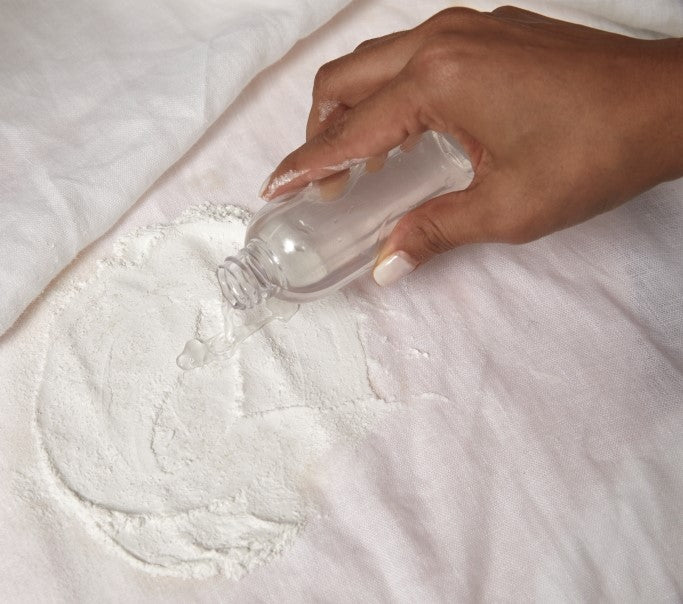How to Care for Table Linens
Our pieces are meant to be used to create long-lasting memories with, but we know life can get messy.
To help you keep them in good condition and take away the stress from getting them dirty, we have prepared easy step-by-step guides on how to remove stains and care for your table linens after daily use

EVERYDAY CARE
Before washing in your washing machine at the recommended setting, ensure all stains have been pre-treated following our stain guide. If you are not sure what caused the stain, pretreat with some heavy-duty detergent, massage the stain, and let sit for at least 15 minutes. When used daily, wash your tablecloth at least once a month. Napkins should be washed after each use.

COTTON
To preserve the quality of your cotton items, machine wash them in cold water with like colors. Use a gentle detergent and avoid bleach. Tumble dry on low or hang to air dry. Iron on a low setting if needed. Store in a cool, dry place to prevent moisture-related damage.

LINEN
For optimal linen care, machine wash in cold water with a mild detergent. Avoid bleach to maintain fabric integrity. Tumble dry on low or air dry for a relaxed look. Iron on medium heat for a crisp finish. Store in a cool, dry place to prevent mildew. Enjoy your linen's natural elegance.

HOW TO DRY
After washing, shake the tablecloth to get rid of excessive wrinkles and check for stains. If you use a dryer, set it on the permanent-press cycle, medium-high heat. If ironing, remove the tablecloth when still slightly damp.

HOW TO IRON
Depending on the look you want to achieve, you don’t always need to iron your tablecloths. But if you do, here’s what’s important: ensure your iron is clean, start by ironing the non-printed side of the fabric first, pushing the cloth section by section over the board. Finish by pressing the print side.

HOW TO STORE
Always wash your tablecloths before storing away; stains that might not be visible may lead to mildew and fabric-eating insects. Only fold tablecloths when completely dry (typically, after ironing they are still damp). To avoid yellowing, wrap your tablecloths in acid-free tissue paper. Place heavier items at the bottom and delicate ones on top.

CARE FOR PRINTS
You might be surprised to hear that caring for your printed tablecloths is not significantly different than caring for your white ones.
Because we use only natural fibres in our products, we always advise against using excessively harsh ingredients as they would weaken the fabric.

PRINTS
For a step-by-step guide on how to clean stains, refer to our guide, but our advice when cleaning our products is:
- Try and spot clean during use when possible
- Never let the stain sit for several days untreated
- Never use chlorine-based bleach, always prefer oxygen-based bleach, which is colour-fast

RED WINE

STEP 1
Soak in water and dishwashing soap as soon as possible.

STEP 2
Make a paste with baking soda or an oxygen-based powder and leave to act for 10 minutes.

STEP 3
Rinse under abundant cold water. If the stain persists, soak in a hydrogen peroxide solution and let stand for 15 minutes.

STEP 4
For persistent stains, pour enzyme liquid detergent and let sit for 15 minutes.

STEP 5
Wash on a gentle cycle with similar colours at maximum 30° Celsius.

STEP 6
Guidance for drying: check the stain is gone before drying. If it's still there, repeat the process from Step 2.

TEA & COFFEE

STEP 1
Rinse under abundant cold water.

STEP 2
Make a paste with powder detergent and gently work it in with a soft-bristled brush.

STEP 3
If it's an old stain, pre-treat with stain remover before the next step.

STEP 4
Wash on a gentle cycle with similar colours at maximum 30° Celsius.

STEP 5
Guidance for drying: check the stain is gone before drying. If it's still there, repeat the process from Step 2.

OIL

STEP 1
Do not rub, remove any oily food residue with a blunt knife, sprinkle starch/baby powder and wait 15 minutes.

STEP 2
Pre-treat the stain with a solvent-based stain remover.

STEP 3
If you don’t have any stain remover at home, make a paste with powder detergent or apply liquid detergent directly on the stain and massage into fabric with a soft-bristled brush.

STEP 4
Wash on a gentle cycle with similar colours at maximum 30° Celsius.

STEP 5
Guidance for drying: check the stain is gone before drying. If it's still there, repeat the process from Step 2.

WAX

STEP 1
Don’t try to remove hot wax as doing this will push it into the fabric. Use an ice-cube to cool down/harden the wax. You can use a napkin to hold it to avoid melting it too fast.

STEP 2
Remove the cold, hardened wax with a blunt knife.

STEP 3
Treat with enzyme-based stain remover or make a paste with powdered detergent. Work it in with fingers or soft brush.

STEP 4
Wash on a gentle cycle with similar colours at maximum 30° Celsius.

STEP 5
Guidance for drying: check the stain is gone before drying. If it's still there, repeat the process from Step 3.
